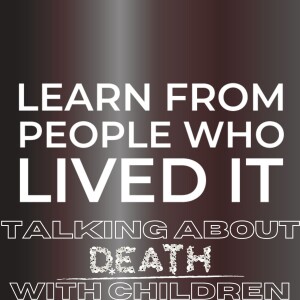Monday Oct 02, 2023
Talking about Death with Children and Connective Compartmentalization with Caryn Kondo

Talking about Death with Children and Connective Compartmentalization with Caryn Kondo
In this episode, you'll hear:
- Best practices to communicate about death with children
- How Caryn dealt with the fears, pain, and desire for control leading up to her cancer diagnosis
- What is connective compartmentalization?
In this episode, Mathew, Dr. Frank, and Caryn discuss how the death of her brother was explained to her when she was a child and how she dealt with it, why the language used to talk about death with children is so important, and how making the switch from caretaker to patient impacted Caryn and her family.
Caryn Kondo grew up in a grieving household. When she was about to turn 5, her younger brother drowned. Her parents did a great job of talking about what happened, but that kind of loss affects everyone in the family. As she grew older, she decided she wanted to help others who were grieving and became a clinical social worker and bereavement specialist. After a long and successful career, a few years into her retirement, Caryn was diagnosed with a rare cancer. After a month of unknowns, it was eventually identified as goblet cell carcinoma, a rare, aggressive subtype of appendix cancer. Caryn tells us she dealt with a lot of insecurity and fear around the unknowns when her doctors couldn't figure out what it was. The time between identifying there was an issue and actually receiving the diagnosis was a time full of pain and struggling to remain in control of the unknown. She was used to being the professional helping others grieve, but then she was in it, and things changed.
As a clinical social worker, "This isn't my story today" was her mantra to help her not take her work home with her. However, after her diagnosis, the challenge in front of her was her story, and she had to find new mental boundaries to help herself survive. Connective compartmentalization is the coping technique she developed. "Building fences, not walls" is how she describes this practice. This method, in addition to new mantras, mindfulness practices, and self-pep talks, got her through it.
"The word death is not a bad word. We can say it with kindness and love."
In this episode, you'll hear:
- Best practices to communicate about death with children
- How Caryn dealt with the fears, pain, and desire for control leading up to her cancer diagnosis
- What is connective compartmentalization?
Follow the podcast:
- Listen on Apple Podcasts (link: https://apple.co/3s1YH7h)
- Listen on iHeart (link: https://ihr.fm/3MEY7FM)
- Listen on Spotify (Link: https://spoti.fi/3yMmQCE)
Resources:
- Dr. Frank Bevacqua
- Jill McMahon’s Episodes: Understanding Suicide, Prevention, and Coping with Loss and The Brain Believes What You Tell It
- Grief Relief Retreat
Connect with Mathew Blades:
- Twitter - twitter.com/MathewBlades
- Instagram - instagram.com/MathewBladesmedia/
- Facebook - facebook.com/mathewbladesmedia/
- Website - learnfrompeoplewholivedit.com/
Additional Credits:
LFPWLI is managed by Sam Robertson
No comments yet. Be the first to say something!